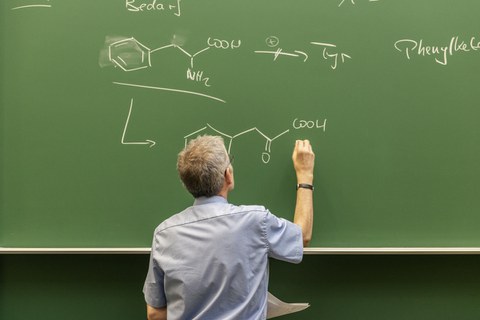Lecturer mobility
Professors, doctoral candidates, research assistants and lecturers of the School of Science at TU Dresden are active in international and intercultural contexts in a wide variety of ways. In many cases, funding for these activities can be applied for.
Table of contents
Funding opportunities
Members of TU Dresden have a wide range of options to fund their mobility, whether for a teaching and research stay or for continuing education and training.
Teaching and researching abroad
By means of a teaching or research visit, internationally active academics and scientists strengthen the international exchange and the cooperation in their subject areas. They impart specialist knowledge to students and also get to know the partner universities in Europe and worldwide.
Below you will find an overview of possible funding regarding:
- Short and long-term lectureships (Erasmus, DAAD),
- Trips to congresses and lectures (DAAD),
- For scientists who carry out joint research projects with their international partners (DAAD).
ERASMUS+ promotes guest lectureships at European partner universities and worldwide. The courses are coordinated in advance with the respective host university and are integrated into the local teaching program. In the ERASMUS Partnerhochschulen database, the current options for an ERASMUS stay for university staff at partner universities of TU Dresden are listed alongside the responsible ERASMUS officers of the respective Faculties.
Details are available at ERASMUS: Guest lectureships at partner universities.
Short and long-term lectureships
Via the DAAD, teaching stays by German university lecturers at universities abroad can be funded from resources of the Federal Foreign Office.
Travel program for congresses and lecture tours
The travel program for congresses and lecture tours funds the active participation of German scientists and academics at congresses abroad and also funds international lecture tours. The condition for funding is that the thematic contributions that are currently important are also significant for the further academic development of the scientists.
PPP – Project Related Personal Exchange
The German Academic Exchange Service has established bilateral programs with partner organizations in various countries to intensify scientific cooperation. As part of these programs, funding is provided to scientists who carry out joint research projects with their international partners.
The Eastern partnership program strengthens and promotes cooperative relations between German universities and universities in Central Eastern, Eastern and Southeastern Europe as well as the countries of the South Caucasus and Central Asia.
The purpose of these stays is to strengthen or initiate collaborations between (early career) scientists of TU Dresden and the partner universities in Central and Eastern Europe. Moreover, during the stay, research-related work can be carried out in archives, university libraries and university-associated institutes.
Funding is available for short study and research stays.
The Franco-German University provides funding to support integrated German-French bi-national and tri-national degree programs. The funding is tied to the development of a program of studies.
The renowned Fulbright Commission funds research and teaching stays of early career scientists and university lecturers at American universities.
The Johann Gottfried Herder Foundation Initiative (a DAAD program) supports and arranges teaching stays of emeritus lecturers at international universities worldwide. The stays are intended to promote networking between international and German universities and to support the international university in its development.
Continuing education and training abroad
A continuing education stay gives lecturers new perspectives based on a coordinated program. In this context, professional exchange and strengthening one's own competence as well as expanding and deepening networks are paramount.
ERASMUS+ makes possible continuing education and training measures abroad for the professional development of university staff. Research projects with a direct reference to research and the participation in conferences are not included in the program.
Details are available at ERASMUS: Continuing education and training measures for university staff.

